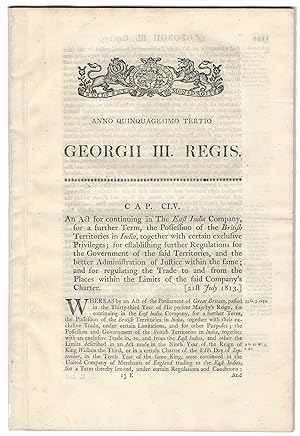Beschreibung
Folio (11.25 inches). 53 George III, Chapter 155. Caption title, pages 1121-1174. Woodcut Royal coat of arms. Neatly extracted from a bound volume and expertly mended. The East India Company Charter Renewal Act, 1813 asserted the sovereignty of the British Crown over the Indian territories held by the Company, and renewed its charter for another 20 years, but deprived the company of its trade monopoly (except for tea and trade with China) and required the company to maintain separate and distinct commercial and territorial accounts. It also opened India to missionaries. The East India Company, originally founded as the Governor and Company of Merchants of London Trading into the East Indies, was a British joint-stock company created in 1600 by Royal Charter granted by Queen Elizabeth I to a group of wealthy London merchants and aristocrats for pursuit of the spice trade with the East Indies. For the first dozen years, each trading voyage was treated separately with its own subscribers or stock-holders, then switched to temporary joint stocks, and finally to permanent joint stocks in 1657. In 1708, the Company merged with some competing English investors and merchants to form the United Company of Merchants of England Trading to the East Indies. The Company focused its efforts on the Indian subcontinent, northwest frontier province, and the Balochistan region, and traded mainly in cotton, silk, indigo dye, salt, saltpetre, tea, and opium. As the British government did not own any shares in the Company, it had little say in its operations and exercised only indirect control. The Company quickly grew into a mega-corporation with immense influence, and eventually ruled large areas of India with its own private army, assuming all military and administrative responsibilities and functions. East India Company rule in India effectively began in 1757, and lasted until 1858 when the Better Government of India Act enabled the British Crown to assume direct control over India during the era of the British Raj. By virtue of the 1858 Act, the Company was rendered powerless and obsolete: its functions had been absorbed into the official government machinery of British India and its armies nationalized by the British Crown. With the passage of the East India Stock Dividend Redemption Act in 1873, the Company was dissolved the following year. Bestandsnummer des Verkäufers 057
Verkäufer kontaktieren
Diesen Artikel melden
![]()
